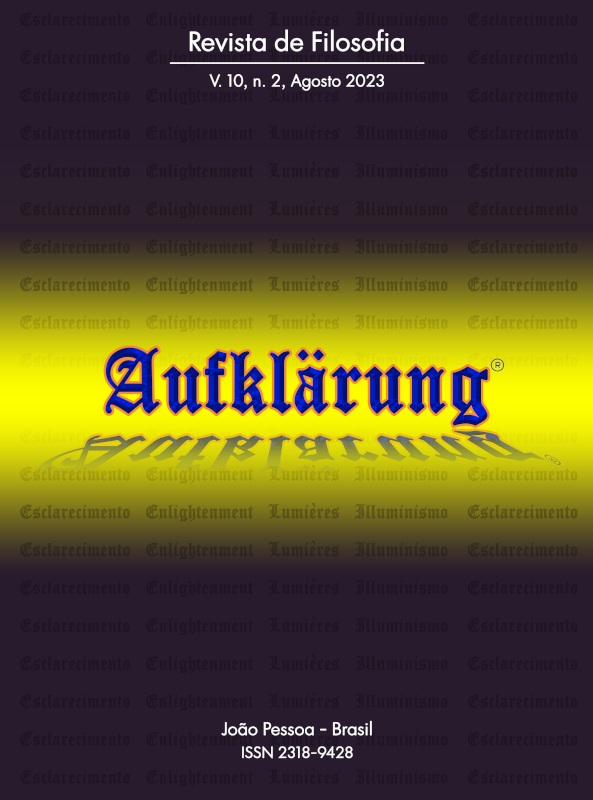Methodological notes observations about the popular song: approaches to the musical studies of Lukács's Aesthetics
DOI:
https://doi.org/10.18012/arf.v10i2.62743Keywords:
Urban folk songs, Music, Methodology applied to songs, Lukács’ AestheticsAbstract
The present essay, of theoretical bibliographical nature, debates some fundamentals of the methodology employed in the analysis of Brazilian urban songs. The approach to the scarce debate involving an investigative method for folk songs relies on the chapter 14 of George Lukács’ Aesthetics. In particular, considering the aims of this essay, the item dedicated to music. Authors who investigate the particular scope of Brazilian urban folk song were consulted to approximate the specific elements of that music. The findings suggest that the study of songs should refrain from dismissing the general categories of the aesthetics, however, their features demand certain cares, which also require a particular methodology to be applied to the contradictions inherent to Brazilian urban folk songs.
Downloads
References
ANDRADE, M. de. Ensaio sobre a música brasileira. 3ª ed. São Paulo: Martins; Brasília: INL, 1972.
BENJAMIN, W. O Narrador: considerações sobre a obra de Nikolai Leskov e Sobre o Conceito de História In BENJAMIN, W. Magia e técnica, arte e política:ensaios sobre literatura e história da cultura. Tradução Sérgio Paulo Rouanet. Obras Escolhidas, vol.1. São Paulo: Brasiliense, 1996.
CHASIN, I. Música e mímesis: uma aproximação categorial e histórica ao pensamento musical. Verinotio. ano V, n. 9, p. 11-33, 2008.
DOMINGOS NETO, M. (Org). Introdução. In NETO M. D. Arte para a nação brasileira. Fortaleza: EdUECE, 2012.
LUKÁCS, G. Conversando com Lukács: Entrevista concedida a Kofler; Albendroth; Holz H. H. Tradução Giseh Vianna. Rio de Janeiro: Paz e Terra, 1969.
LUKÁCS, G. Estética: la peculiaridad de lo estético. Tradução de Manuel Sacristán. Barcelona: Ediciones Grijalbo, 1966a, v. 1.
LUKÁCS, G. Estética: la peculiaridad de lo estético. Tradução de Manuel Sacristán. Barcelona: Ediciones Grijalbo, 1966b, v. 2.
LUKÁCS, G. Estética: la peculiaridad de lo estético. Tradução de Manuel Sacristán. Barcelona: Ediciones Grijalbo, 1967a, v. 3.
LUKÁCS, G. Estética: la peculiaridad de lo estético. Tradução de Manuel Sacristán. Barcelona: Ediciones Grijalbo, 1967b, v. 4.
LUKÁCS, G. Para a ontologia do ser social. Volume 14. Tradução Sergio Lessa. Maceió: Coletivo Vereda, 2018a.
LUKÁCS, G. Para a ontologia do ser social. Tradução Sergio Lessa. Volume 13. Maceió: Coletivo Vereda, 2018b.
MARX, K. O capital: crítica à economia política. Tradução Regis Barbosa e Flávio R. Kothe. São Paulo: Abril Cultural 1996. v. 1. [Coleção os Economistas].
MARX, K. Marx: Cadernos de Paris e Manuscritos Econômico-Filosóficos de 1844. Tradução José Paulo Netto e Maria Antónia Pacheco. São Paulo: Expressão popular, 2015.
MORAES, J. G. V. de. História e música: canção popular e conhecimento histórico. Revista Brasileira de História. São Paulo, v. 20, nº 39, p. 203-221. 2000.
NAPOLITANO M. História e música. Belo Horizonte: Autêntica, 2005.
ROMANELLI, O. de O. História da Educação no Brasil. Petrópolis, Rio de Janeiro: Editora Vozes, 1978.
SANTOS, D. A ética na Estética de Lukács: a arte como unanimidade anônima.Marília: Lutas Anticapital, 2021.
SANTOS, D. Arte-educação, estética e formação humana. Maceió: Coletivo Veredas, 2020.
SANTOS, D. Estética em Lukács: a criação de um mundo para chamar de seu. São Paulo: Instituto Lukács, 2018.
SODRÉ, N. W. Síntese de história da cultura brasileira. Rio de Janeiro: Civilização Brasileira, 1979.
TINHORÃO, J. R. História social da música. São Paulo: Editora 34, 1998.
Additional Files
Published
How to Cite
Issue
Section
License

This work is licensed under a Creative Commons Attribution 4.0 International License.
Journal general policy
1.This journal works under a Creative Commons License aplied to online journals. That icence can be read in the following link: Creative Commons Attribution 4.0 International (CC BY 4.0).
2.Accordingly to this License, a)the journal declares that authors hold the copyright of their articles without restrictions, and they can archieve them as post-print elsewhere. b)the journal allow the author(s) to retain publishing rights without restrictions.
Metadata Policy for information describing items in the repository
1. Anyone may access the metadata free of charge at anytime.
2.The metadata may be re-used in any medium without prior permission, even commercial purposes provided the OAI Identifier or a link to the original metadata record are given, under the terms of a CC BY license refered for the Journal.







































